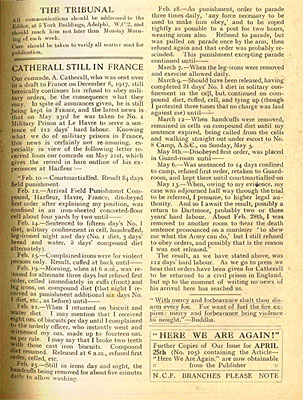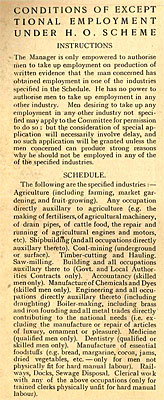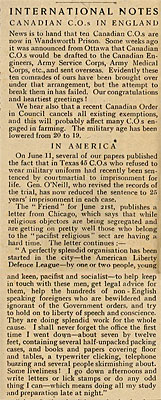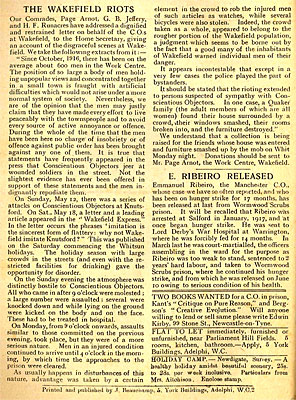
| HOME | TRIBUNAL HOME |
June 1918
Back to COs - international situation has calmed down, the front has re-stabilised, the governments intimidation tactics have not worked (and they’re giving it a rest - for the moment at least)
After several difficult months, June 1918 began on a calmer note for the staff of the Tribunal. Prosecutions behind them, and with newly called-up men to monitor, the Tribunal turned back to it’s focus on the experiences of COs in prisons and work camps around the country. Though concessions had been made to release dangerously ill COs, thousands of men were still trapped within the system, shuttled from prison to camp and back again, and still being released from one sentence into the grasp of the military.
6th June: Catherall still in France
Even in this late stage of the war, Conscientious Objectors were still being sent over to France. It had been two years since Army Order X had guaranteed that resisting Conscientious Objectors were not to be transferred abroad, and were instead to be governed by civilian law after a court martial, but the practice still continued.
Alfred Catherall was one of the last COs to have been sent to France in full knowledge that he was an Absolutist CO. Conscripted in 1916, he had already spent three short sentences in prison, as well as a year on the Home Office Scheme. In December 1917, he was returned to his unit, and shipped over to France, firmly in the hands of the military. 
Despite six months in France, the Tribunal reports Catherall “still heroically continues his refusal to obey military orders, be the consequence what they may”. Fragments of his experiences were sent to the NCF through letters, outlining a prolonged period of resistance to the worst the military could throw at him:
“Feb 12. - Arrival Field Punishment COmpound, Harfleur, Havre, France, disobeyed first order after explaining my position, was confined in an iron sheeted concreted floor cell about four yards by two”
“Feb 25. - Still in irons day and night, the handcuffs being removed for about five minutes daily to allow washing”
“Feb 28. - As punishment, order to parade three times daily, “any force necessary to be used to make him obey”, and to be roped as tightly as possible to a post for two hours, wearing irons also.”
Confined to a tiny, freezing, cell, suffering field punishment number one and on a starvation diet, Catherall continued to resist, eventually being returned to Britain the day before the article was published, on the 5th of June. But why had Catherall been sent to France in the first place? The military punishment of Conscientious Objectors was largely over, most units preferring to wash their hands of COs and transfer them to civilian prison. Unlike the situation in 1916, there was no official confusion over who should deal with COs, and Catherall, having already been in prison, had a record that would leave noone in doubt as to the sincerity of his objection. It is possible that Catherall had found himself in a unit with little experience of dealing with COs, who did not know, or worse, did not care, about Army Order X.
6th June: Conditions of Exceptional Employment under H.O Scheme
“Conditions of Exceptional Unemployment” is not revelatory or even (particularly) interesting as an article, but it marks one of the last significant shifts in the treatment of Absolutist Conscientious Objectors that would come before the armistice. After two years, conditions on the Home Office Scheme were nearing breakdown - too many men, held for too long, and put to useless work were agitating more and more steadily for a radically different system. 
They didn’t get a radical change, but the “exceptional employment” scheme was, for many, an acceptable answer. COs in the work camps - essentially by mid 1918 low security prisons - were allowed to seek out and take up employment outside the bounds of the scheme. Only specified industries were deemed suitable, but taking up a job in one of them would allow a CO to leave the confines of the camps, perhaps even returning home. Exceptional Employment was granted on a case by case basis, and was slow to roll out, but hundreds of men around the country had taken it up by the end of the war.
While they would still be nominally bound by the assurances of good behaviour they had signed as part of accepting the scheme, in practice most COs who took up exceptional employment found their “CO story” ended. Usually working in their own jobs, much closer to home, they began to filter out of the system, ending the war and their personal resistance to militarism much as they had begun it, two pointless years of prison later. The Exceptional Employment scheme seemed to be a clear sign that the civil government was winding down it’s campaign against Scheme men - but the rest of June would prove their problems weren’t over yet.
20th June: The Wakefield Riots
Low-level friction with local communities had been a consistent feature of life on the Home Office Scheme, and occasional outbreaks of violence against COs were seen from late 1916 to the dissolution of the scheme in 1919. May 1918 had seen some of the most severe, beginning in Knutsford and then, deliberately inspired by the local press, spreading to Wakefield.
On Sunday 12th of May, large crowds gathered to harass COs, which quickly escalated into physical violence. The Tribunal reports that “all who came in after 9 o clock were molested; a large number were assaulted; several were knocked down and while lying on the ground were kicked on the body and on the face”. This violence continued through Monday, with the Police “except in a very few cases” playing “the part of bystanders”. Civilians suspected of sympathising with COs were assaulted, and a Quaker household was broken into and looted during the riots.
The justification given in the press, and in parliament, was that COs had “jeered at the wounded soldiers in the street”, despite the fact that “not the slightest evidence has ever been offered in support of these statements”. The riots were an artificially constructed expression of anger at fabricated insults - fanned by a hostile press and allowed to escalate by the deliberate inaction of the police.
The official response was as perfunctory as it had been with previous riots and disturbances in which COs were assaulted. The government line in the House of Commons was that the outburst at Wakefield was the regrettable (but not that regrettable) result of an outburst of “popular indignation at the unpatriotic attitude adopted by these men in the present crisis”. Same old, same old - there would be no investigation into the riots, and noone would be charged with any crime.
27th June: International Notes
Many of the articles in June check in with COs, governments and pacifist movements that had not featured in the pages of the Tribunal for some time. With the entry of the USA into the war, bringing along it’s own system of conscription, exemption and Conscientious Objection, the Tribunal found yet another kindred spirit organisation dedicated to resisting war.
 But first to the continuing saga of Canadian COs. Conscription in Canada had been covered by the Tribunal in previous months, but in June 1918, Canadian COs began to arrive in Britain. Unusually among the Commonwealth countries, the Canadian army seems to have disposed of it’s COs using the British practice of civilian incarceration - the ten “comrades of ours” are sent to Wandsworth - with “congratulations and heartiest greetings!” from the Tribunal.
But first to the continuing saga of Canadian COs. Conscription in Canada had been covered by the Tribunal in previous months, but in June 1918, Canadian COs began to arrive in Britain. Unusually among the Commonwealth countries, the Canadian army seems to have disposed of it’s COs using the British practice of civilian incarceration - the ten “comrades of ours” are sent to Wandsworth - with “congratulations and heartiest greetings!” from the Tribunal.
The situation in the USA would have seemed very familiar to the staff of the NCF - the “American Liberty Defence League”, a socialist, religious and pacifist organisation has been set up to resist conscription and support COs across the country, especially those “non-english speaking foreigners who are bewildered and ignorant of the government orders”, with the explicit aim of holding on to the “liberty of speech and conscience”. Even the offices seem similar across the pond, with “books and papers covering floor and tables, a typewriter clicking, telephone buzzing and several people skirmishing about”. Clearly the work of a CO organisation, wherever in the world, was chaotic, endless and exhausting - but worthwhile.
Clink on images to enlarge
